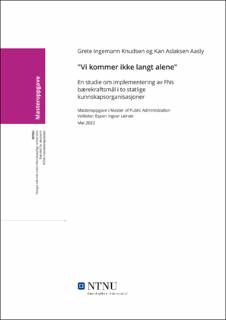| dc.contributor.advisor | Leirset, Espen Ingvar | |
| dc.contributor.author | Aasly, Kari Aslaksen | |
| dc.contributor.author | Knudsen, Grete Ingemann | |
| dc.date.accessioned | 2022-09-10T17:20:21Z | |
| dc.date.available | 2022-09-10T17:20:21Z | |
| dc.date.issued | 2022 | |
| dc.identifier | no.ntnu:inspera:112629013:114036754 | |
| dc.identifier.uri | https://hdl.handle.net/11250/3017044 | |
| dc.description.abstract | Denne oppgaven er en undersøkelse av hvordan statlige kunnskapsorganisasjoner jobber med FNs bærekraftsmål. Med utgangspunkt i Norges geologiske undersøkelse (NGU) og Nord universitet (Nord) har vi stilt spørsmålet om i hvor stor grad de har implementert bærekraftsmålene. FNs bærekraftsmål ble vedtatt av alle FNs medlemsland i 2015 og var en viktig milepæl for verden. Gjennom resolusjonen som ble vedtatt i Paris har alle FNs medlemsland forpliktet seg til 2030-Agendaen med de 17 bærekraftsmålene. Dette innebærer at også Norge må ha en plan for hvordan vi skal bidra til dette.
Med bakgrunn i dette har vi gjort en kvalitativ undersøkelse om hvordan NGU og Nord ser på dette og hvor langt de har kommet i arbeidet. Dette har vi gjort ved hjelp av intervju og dokumentstudier. I vår undersøkelse har vi intervjuet ledere og nøkkelpersoner i Nord og NGU, samt ansatte i de respektive eierdepartementene, Nærings- og fiskeridepartementet og Kunnskapsdepartementet. Vi har også gjort en dokumentanalyse av styrende dokumenter fra departementene samt fra Nord og NGU. Vi har følgende problemstilling:
I hvor stor grad har statlige kunnskapsorganisasjoner som NORD og NGU implementert FNs bærekraftsmål?
For å besvare oppgaven har vi tatt utgangspunkt i 3 teoretiske tilnærminger som har policyutforming og iverksetting til felles. Dette er implementeringssteori, translasjonsteori og teori rundt samskaping og styring av dette.
Våre hovedfunn viser at NGU og Nord, når det gjelder bærekraftsmålene, er tidlig i implementeringsfasen foreløpig. Dette kan til dels forklares med at bestillingen fra eierdepartementene har vært uklar og i liten grad og samordnet. Våre funn viser også at NGU har kommet noe lenger enn Nord med dette arbeidet og i større grad translaterer bærekraftsmålene som et verktøy i tillegg til et rapporteringssystem. Både departementene og virksomhetene er i ferd med å ta målene innover seg og ser at man må endre seg og arbeide på en annen måte for å nå målene, men det lite som er gjort på dette området ennå. Strukturelle hindre, i dagens organisering, gjør det krevende å få til samskaping som vil være nødvendig for å nå FNs bærekraftsmål. | |
| dc.description.abstract | This thesis is a study on how knowledge based governmental agencies work with UNs Sustainable Development Goals (SDG). Based on The Geological Survey of Norway (NGU) and Nord University (Nord) we have asked the question to what degree they have implemented the SDGs. UNs sustainable development goals was decided by all UN members states in 2015 and was an important milestone for the world. Through the resolution, that was decided in Paris, all UN member states have committed to the 2030 Agenda with the 17 SDG. This also implies that Norway needs a plan for its contribution.
Based on this we have executed a qualitative study on how NGU and Nord approaches this and how far they are in implementing the work. We have based this study on interviews and document studies. We have interviewed leaders and key personnel in both the governmental agencies and informants in the respective ministries, Ministry of Trade, Industry and Fishery and Ministry of Education and Research. In our document analysis we have used steering documents from the ministries, Nord and NGU. In this thesis we address the following issue:
To what extent have knowledge based governmental agencies like Nord and NGU implemented UNs Sustainable Development Goals?
To answer the questions, we have used 3 theoretical approaches that all have policy design and implementation in common. This is implementation theory, translation theory and theory on co-creation and management.
Our main findings are at NGU and Nord, when it comes to the SDG, are at an early stage of implementation. This can partly be explained by the fact that the request from the ministries were unclear and to a small degree coordinated. Our findings also show that NGU have come a little further than Nord with this work, and to a larger degree translate the SDG as a tool in addition to a reporting system. Both the ministries and the agencies are in process of taking the goals into account and realize that they might need to change and work differently, but not much have been done here yet. Structural obstacles in today’s organization, makes it demanding to have co-creation that will be necessary to achieved UNs Sustainable Development Goals. | |
| dc.language | nob | |
| dc.publisher | NTNU | |
| dc.title | "Vi kommer ikke langt alene"
En studie om implementering av FNs bærekraftsmål i to statlige kunnskapsorganisasjoner | |
| dc.type | Master thesis | |
